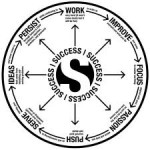1. Practice empathy. Make it a habit to try to place yourself in the shoes of another person. Any person. Loved ones, co-workers, people you meet on the street. Really try to understand, to the extent that you can, what it is like to be them, what they are going through, and why they do what they do.
2. Practice compassion. Once you can understand another person, and feel what they’re going through, learn to want to end their suffering. And when you can, take even a small action to somehow ease their suffering in some way.
3 How would you want to be treated? The Golden Rule doesn’t really mean that you should treat someone else exactly as you’d want them to treat you … it means that you should try to imagine how they want to be treated, and do that. So when you put yourself in their shoes, ask yourself how you think they want to be treated. Ask yourself how you would want to be treated if you were in their situation. John F. Kennedy did that during the controversial days of de-segregation in the 1960s, asking white Americans to imagine being looked down upon and treated badly based only on the color of their skin. He asked them to imagine how they would want to be treated if they were in that situation, and act accordingly towards the blacks.
4. Be friendly. When in doubt, follow this tip. It’s usually safe to be friendly towards others. Of course, there are times when others just don’t want someone acting friendly towards them, and you should be sensitive to that. You should also be friendly within the bounds of appropriateness. But who doesn’t like to feel welcome and wanted? 5. Be helpful. This is probably one of the weaknesses of our society. Sure, there are many people who go out of their way to be helpful, and I applaud them. But in general there is a tendency to keep to yourself, and to ignore the problems of others. Don’t be blind to the needs and troubles of others. Look to help even before you’re asked.
6. Be courteous in traffic. Another weakness of our society. There are few times when we are as selfish as when we’re driving. We don’t want to give up the right of way, we cut people off, we honk and curse. Perhaps it’s the isolation of the automobile. We certainly don’t act that rude in person, most of the time. So try to be courteous in traffic.
7. Listen to others. Another weakness: we all want to talk, but very few of us want to listen. And yet, we all want to be listened to. So take the time to actually listen to another person, rather than just wait your turn to talk. It’ll also go a long way to helping you understand others.
8. Overcome prejudice. We all have our prejudices, whether it’s based on skin color, attractiveness, height, age, gender … it’s human nature, I guess. But try to see each person as an individual human being, with different backgrounds and needs and dreams. And try to see the commonalities between you and that person, despite your differences.
9. Stop criticism. We all have a tendency to criticize others, whether it’s people we know or people we see on television. However, ask yourself if you would like to be criticized in that person’s situation. The answer is almost always “no”. So hold back your criticism, and instead learn to interact with others in a positive way.
10. Don’t control others. It’s also rare that people want to be controlled. Trust me. So don’t do it. This is a difficult thing, especially if we are conditioned to control people. But when you get the urge to control, put yourself in that person’s shoes. You would want freedom and autonomy and trust, wouldn’t you? Give that to others then.
11. Be a child. The urge to control and criticize is especially strong when we are adults dealing with children. In some cases, it’s necessary, of course: you don’t want the child to hurt himself, for example. But in most cases, it’s not. Put yourself in the shoes of that child. Remember what it was like to be a child, and to be criticized and controlled. You probably didn’t like it. How would you want to be treated if you were that child?
12. Send yourself a reminder. Email yourself a daily reminder (use Google Calendar or memotome.com, for example) to live your life by the Golden Rule, so you don’t forget.
13. Tie a string to your finger. Or give yourself some other reminder throughout the day so that you don’t forget to follow the Golden Rule in all interactions with others. Perhaps a fake golden ring on your keychain? A tattoo? 🙂
14. Post it on your wall or make it your home page. The Golden Rule makes a great mantra, and a great poster.
15. Rise above retaliation. We have a tendency to strike back when we’re treated badly. This is natural. Resist that urge. The Golden Rule isn’t about retaliation. It’s about treating others well, despite how they treat you. Does that mean you should be a doormat? No … you have to assert your rights, of course, but you can do so in a way where you still treat others well and don’t strike back just because they treated you badly first. Remember Jesus’ wise (but difficult to follow) advice: turn the other cheek.
16. Be the change. Gandhi famously told us to be the change we want to see in the world. Well, we often think of that quote as applying to grand changes, such as poverty and racism and violence. Well, sure, it does apply to those things … but it also applies on a much smaller scale: to all the small interactions between people. Do you want people to treat each other with more compassion and kindness? Then let it start with you. Even if the world doesn’t change, at least you have.
17. Notice how it makes you feel. Notice how your actions affect others, especially when you start to treat them with kindness, compassion, respect, trust, love. But also notice the change in yourself. Do you feel better about yourself? Happier? More secure? More willing to trust others, now that you trust yourself? These changes come slowly and in small increments, but if you pay attention, you’ll see them.
18. Say a prayer. There is a golden rule prayer attributed to Eusebius of Caesarea, that would be worth saying once a day. It includes the following lines, among others: “May I gain no victory that harms me or my opponent
May I reconcile friends who are mad at each other.
May I, in so far as I can, give all necessary
help to my friends and to all who are in need.
May I never fail a friend in trouble.
The above was written by Zen Habits























